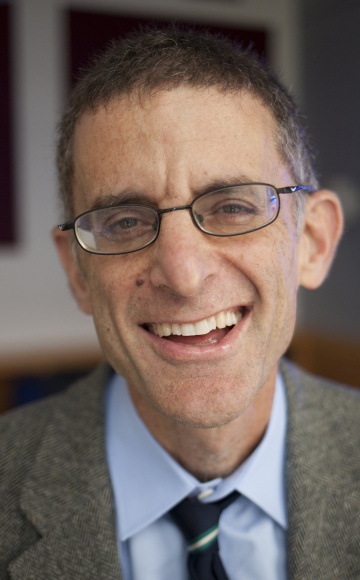Columbia College | Columbia University in the City of New York
Take Five with Jonathan Zimmerman ’83

What were you like when you arrived at Columbia?
I was a tall skinny kid from the D.C. suburbs, sporting a beard and a shaggy head of hair that was known colloquially as a “Jew-fro.” The problem was that my beard came in, but without a mustache! Not a good look, even for 1979.
What do you remember about your first-year living situation?
I was fortunate enough to be paired with Michael McNulty ’83, GSAS’85, a kind and funny refugee from a foreign land that was shrouded in myth and mystery. I speak, of course, of New Jersey! Mike rode motorcycles and wore leather jackets, which were both strange rituals to me, but we were friends before we unpacked. I still regard rooming with him as one of the greatest strokes of luck in my life. My students now select their first-year roommates by going onto the internet and finding someone ... just like them. Doesn’t that defeat the whole point of “diversity,” which is supposed to expose us to people who are not like us?
What Core class or experience do you most remember and why?
I took Lit Hum my sophomore year with Matthew Wikander, a Shakespeare scholar who asked us over and over again — but always in different ways — why we’re on Earth. I don’t think we had very good answers! But that was the whole point, of course: to learn how little you really knew. Wikander would sit in front of the class, his dog-eared copy of the week’s book in hand, and implore us to tell him the meaning of the text and, more generally, of life. He also told us that St. Augustine was a “f-king genius,” which is something I haven’t forgotten, either.
Did you have a favorite spot on campus, and what did you like about it?
The Spectator office in Ferris Booth Hall, a drab piece of postwar dreck that has since been replaced by the gleaming glass palace known as Alfred Lerner Hall. It was a total dump. But damn it, it was our dump! Spectator was where I got my real education, as a writer and an editor. In the days before desktop publishing, we had to stay up until 6 a.m. pasting news onto big pieces of cardboard. Then we would have breakfast at Tom’s, catch a few hours of sleep and do it all over again. That’s the kind of thing you can only pull off when you’re 20 years old. I get tired just thinking about it now.
What, if anything, about your College experience would you do over?
Honestly? Nothing. I’m glad that I went to Columbia during its downmarket phase, before everything got brushed up. The school wasn’t nearly as selective then, so none of us thought we were big deals for being there. And that message was reinforced by our, um, spartan surroundings. When you shower young people with lots of nice stuff, like our elite schools do today, you answer the meaning-of-life questions before they’re even asked. What’s the good life? One with lots of nice stuff, of course.
More “Take Five”
- 1 of 32
- ›

